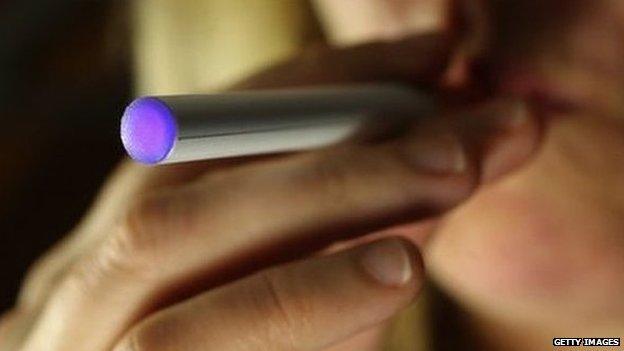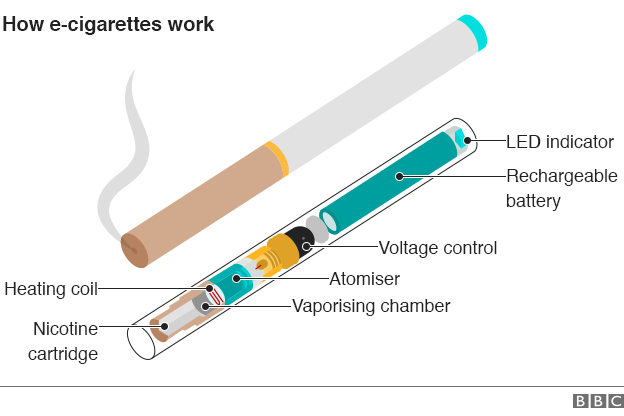E-cigarettes could be prescribed by the NHS to help smokers quit, report says
- Published
- comments

E-cigarettes are 95% less harmful than tobacco and could be prescribed on the NHS in future to help smokers quit, a review of their use has concluded.
Experts who have compiled a report for Public Health England say "vaping" could be a "game changer" for persuading people to quit cigarettes.
They also say there is no evidence they give children a "gateway" into smoking.
Some health campaigners have welcomed the findings, but the British Medical Association has expressed caution.
The Welsh government has previously announced that it plans to ban the use of e-cigarettes in enclosed spaces. Now opposition parties have criticised the plans.
E-cigarettes are increasingly popular and are now used by 2.6 million adults in Britain.
But public health experts have been divided over whether they should be seen as a much safer alternative to smoking, or a pathway to a deadly addiction.
Public Health England asked a team of experts to examine the emerging evidence.
Their findings are unequivocal. On the question of safety, they conclude - as a broad estimate - that e-cigarettes are "around 95% less harmful" than smoking.

One of the report authors, Prof Ann McNeill from King's College London, said e-cigarettes could be a "game-changer" in public health.

1. On some e-cigarettes, inhalation activates the battery-powered atomiser. Other types are manually switched on
2. A heating coil inside the atomiser heats liquid nicotine contained in a cartridge
3. The mixture becomes vapour and is inhaled. Many e-cigarettes have an LED light as a cosmetic feature to simulate traditional cigarette glow.
Different brands of e-cigarettes contain different chemical concentrations.

"At the moment, 80,000 people [in England] die every year as a result of cigarette smoking. If everybody who was smoking switched to e-cigarettes that would reduce to about 4,000 deaths a year. That's the best estimate at the moment. It may well be much, much lower than that."
The report says that although GPs and stop-smoking services are currently not able to prescribe e-cigarettes as none of the products on the market are licensed for medicinal purposes, they hope that hurdle will be removed in the future.

Potential cost
By Hugh Pym, BBC health editor
From nowhere to more than 2.5 million British users in under a decade - the e-cigarette story has moved at a dramatic pace
But what about the cost of prescribing?
In England in 2013-14, there were nearly 1.8 million prescription items to help patients stop smoking.
More than half were for Nicotine Replacement Therapy, including patches, gum and sprays.
The cost to the NHS in that year was just under £49m, down on the figure three years earlier.
If approved, e-cigarettes would add to that total, with the kit costing £20 or more and replacement fluid about £10-a-week for the average smoker trying to kick the habit.
Health campaigners will argue that the cost is justified by long-term savings on the treatment of smoking related diseases.

Public Health England says it is "committed to ensure that smokers have a range of evidence-based, effective tools to help them to quit.
"We encourage smokers who want to use e-cigarettes as an aid to quit smoking to seek the support of local stop-smoking services, given the potential benefits as quitting aids," it adds.
"PHE looks forward to the arrival on the market of a choice of medicinally regulated products that can be made available to smokers by the NHS on prescription."
In the meantime, Prof McNeill said she would urge health professionals to discuss the use of e-cigarettes with people who want to quit smoking.
"If I was running a stop-smoking service, I would encourage people who are interested in trying e-cigarettes to have a go. I would also be recommending all the other evidence-based medications that people can use."
The review also highlights evidence that growing numbers of people have doubts over the safety of the devices. It says nearly half the population (44.8%) do not realise e-cigarettes are much less harmful than smoking.
Elaine Butler, ex-tobacco smoker: "I thought an e-cig would be no good... but it helped"
Prof Kevin Fenton, director of health and wellbeing at Public Health England, said it was important to tackle what he called "harmful myths".
"E-cigarettes are not completely risk-free but when compared to smoking, evidence shows they carry just a fraction of the harm. The problem is people increasingly think they are at least as harmful and this may be keeping millions of smokers from quitting."
Strong regulation
The report concludes there is no evidence, so far, that e-cigarettes are acting as a route into smoking for children or non-smokers. It says regular use is found "almost exclusively" among those who have already smoked, and that e-cigarettes have rapidly become the most widely used quitting aid in England.
The findings have been welcomed by Action on Smoking and Health (Ash). The charity's chief executive, Deborah Arnott, said: "This timely statement from Public Health England should reassure health professionals, the media, and the public, particularly smokers, that the evidence is clear: electronic cigarettes are very much less harmful than smoking."
The British Medical Association, which has backed curbs on the use of e-cigarettes, was more guarded. Spokesman Dr Ram Moorthy said the review would help ensure an informed debate, but he insisted the public needed protection.
"We need to see a stronger regulatory framework that realises any public health benefit they may have, but addresses significant concerns from medical professionals around the inconsistent quality of e-cigarettes, the way they are marketed, and whether they are completely safe and efficient as a way to reduce tobacco harm."
A spokesman for the Welsh Government, which aims to restrict e-cigs in line with cigarettes, said: "We are concerned the use of e-cigarettes may renormalise smoking, especially for a generation who have grown up in a largely smoke-free society.
"We are not alone in our concerns - the World Health Organisation and other international bodies have called for greater regulation of e-cigarettes and 40 other countries have already taken similar steps.
"Our Bill does not aim to prevent the use of e-cigarettes for those seeking to give up conventional smoking."
- Published9 June 2015
- Published9 June 2015
